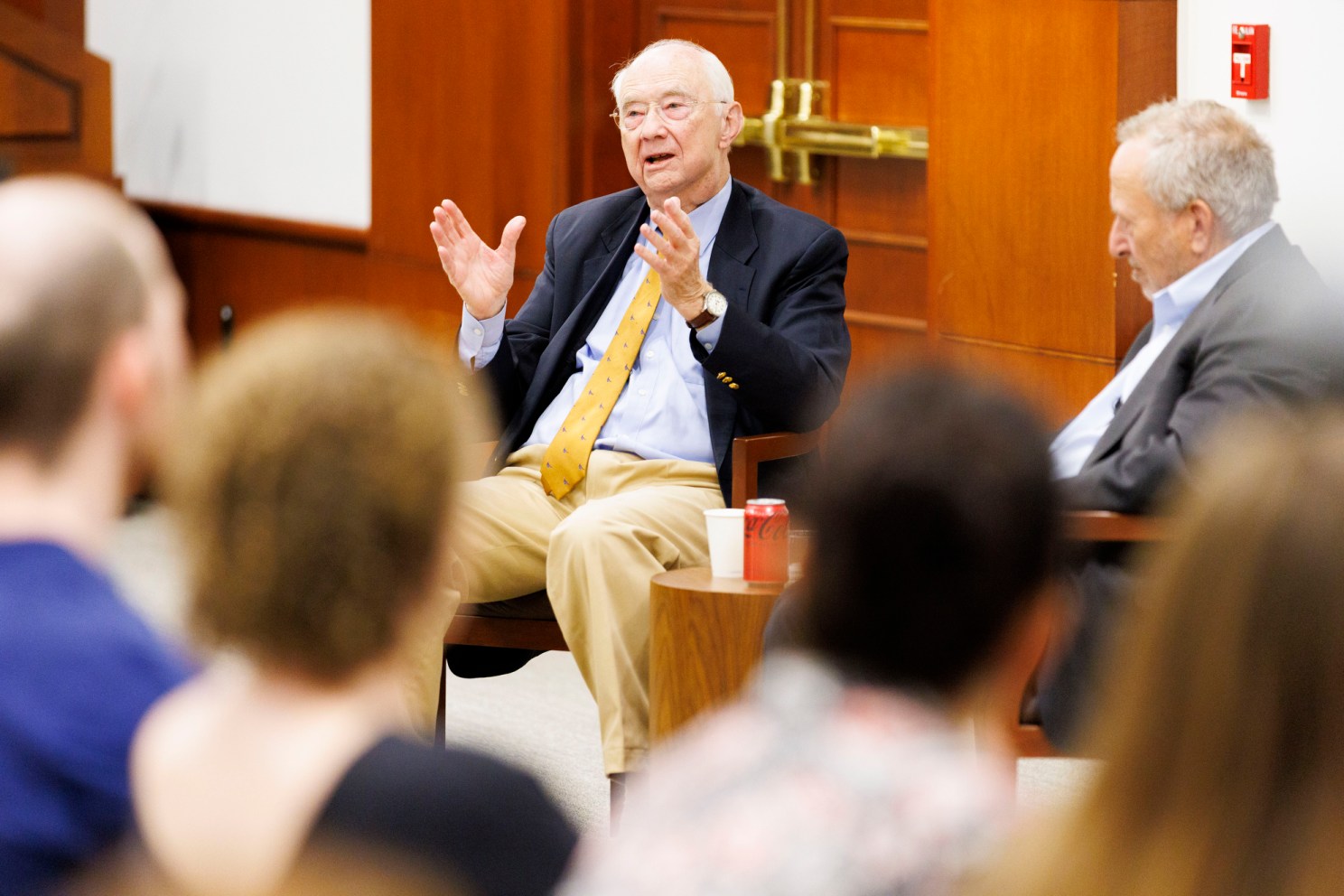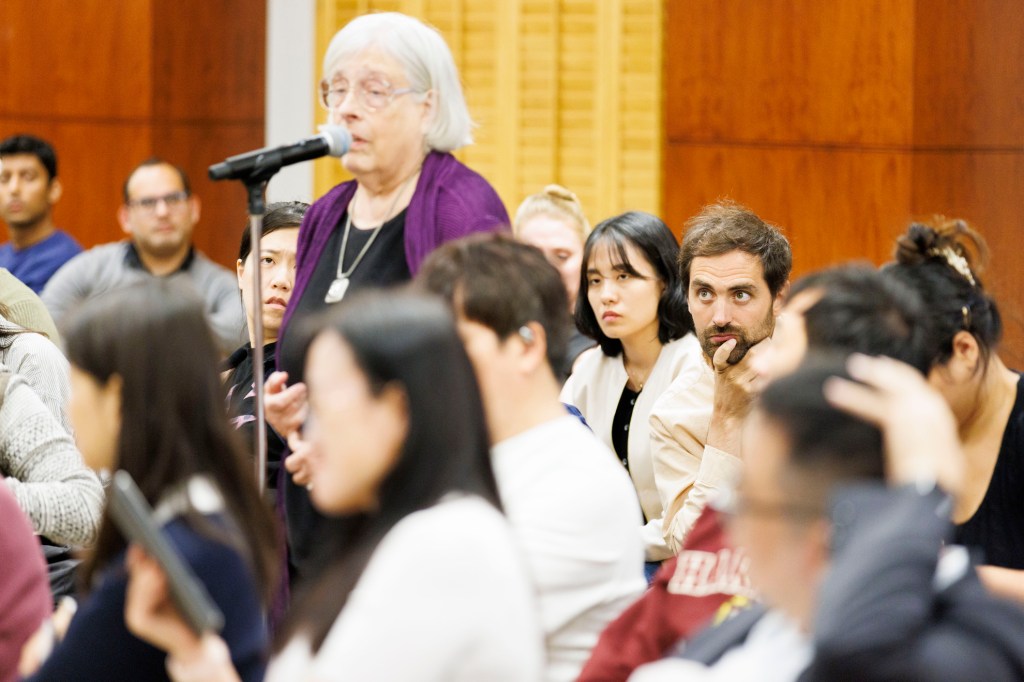Rebutting ‘myths of inequality’
Rebutting ‘myths of inequality’

Former veteran legislator, economist Phil Gramm argues unequal distribution of wealth inevitable; policy to engineer level playing field is mistake
There’s nothing inherently wrong with unequal distribution of income or wealth in the nation, according to Phil Gramm, former veteran U.S. legislator and economist.
The problems arise when the federal government tries to engineer a level playing field, whether through blunt corporate anti-trust regulations or through assistance programs for the poor, said the Texas Republican, who spent about three terms each in the House and Senate, during a talk last Tuesday at Harvard Kennedy School.
“People have different aptitudes and interests, different levels of energy, and inequality is a natural occurrence of competition. I’m not upset by inequality,” Gramm told Harvard economist Larry Summers during a conversation about economic policy.
The two worked together in the late 1990s when Gramm chaired the Senate Banking Committee and Summers was named U.S. Treasury secretary by then-President Bill Clinton.
Gramm, who holds a Ph.D. from the University of Georgia and taught at Texas A&M, discussed what he called “myths” about key periods in U.S. economic history, from the Industrial Revolution to the 2008-2009 financial crisis, the subject of his 2022 book, “The Myth of American Inequality: How Government Biases Policy Debate.”
The debate over income and wealth inequality has been shaped by progressive critics, such as French economist Thomas Piketty, who often overstate the gap between rich and poor by only considering earned income and ignoring the value of benefits most lower-income individuals receive from the government, like Medicaid or food stamps, Gramm argued.
“So, when you see that the poverty family has an income of $29,000, that’s not counting a refundable tax credit because they don’t take taxes into account; that’s not counting food stamps, where you get a debit card and you go the grocery store; that’s not counting rent subsidies, not counting Medicaid,” Gramm said. “If you count all those things, the ratio of the top quintile to the bottom is not 16, 17 to 1, but 4 to 1.”
Summers, the Charles W. Eliot University Professor and the Frank and Denie Weil Director of the Mossavar-Rahmani Center for Business and Government at HKS, agreed that many official statistics underestimate the income of lower-income people so they appear in worse shape than they actually are, which some then use as the basis for an argument for more assistance programs.
Even when those programs successfully reduce the number of poor people, government data often doesn’t reflect that, he added.
Theda Skocpol, Ph.D. ’75, Victor S. Thomas Professor of Government and Sociology, pushed back on Gramm’s assertion.

Even if what he says is accurate, she said, “Inequalities of wealth and income have still skyrocketed to an extraordinary degree since the late 1970s.”
The big winners during the Industrial Revolution, tycoons such as Andrew Carnegie, greatly benefited from federal subsidies, Skocpol said.
“A lot of those fortunes were made out of government contracts given through patronage capitalism during and after the Civil War,” a situation that is again rampant today to “an extraordinary degree,” she said.
“A lot of the fortunes that are being made by the people who are attending those dinners in the White House are being made through favored government contracts, and we can’t be sure that’s going to maximize efficiency at all, let alone opportunity to innovate in a vibrant capitalist economy.”
Gramm also addressed the decision by the Trump administration to have the government take equity stakes in private companies like Intel. He said he adamantly opposed the practice because of the negative potentialramifications to the economy.
“It’s ripe for corruption and special treatment, and again you’ve got to look when you start this kind of thing, even if your intentions are good and even if your first selectees are good, you got to accept the fact that it’s going to be” done repeatedly with no end in sight, he said.
Gramm argued for a simpler tax system with fewer deductions and lower rates as part of a debate on the merits of taxing income right away while allowing capital gains to be shielded until assets are sold.
The veteran lawmaker was asked whether the record wealth of Silicon Valley tech entrepreneurs like Elon Musk, who has amassed a nearly $1 trillion fortune, ought to be somehow regulated.
He demurred, saying Musk created that $1 trillion in value for shareholders, and his products provide benefit to consumers.
“He did more good making it than he’ll ever do giving it away,” he said.
Latest Harvard
- Time for mandatory retirement ages for lawmakers, judges, presidents?Americans seem to mostly say yes; legal, medical scholars point to complexities of setting limits
- In dogs, as in humans, a harsh past might bare its teethEarly adversity leads to higher aggression and fearfulness in adult canines, study says
- Brief bursts of wisdomAphorism lover and historian James Geary reflects on how ancient literary art form fits into age of social media
- Flew home as Will Flintoft, returned as Rhodes ScholarApplied math concentrator to study computer science, theology with eye toward AI
- What will AI mean for humanity?Scholars from range of disciplines see red flags, possibilities ahead
- Tai Tsun Wu, 90Memorial Minute — Faculty of Arts and Sciences






